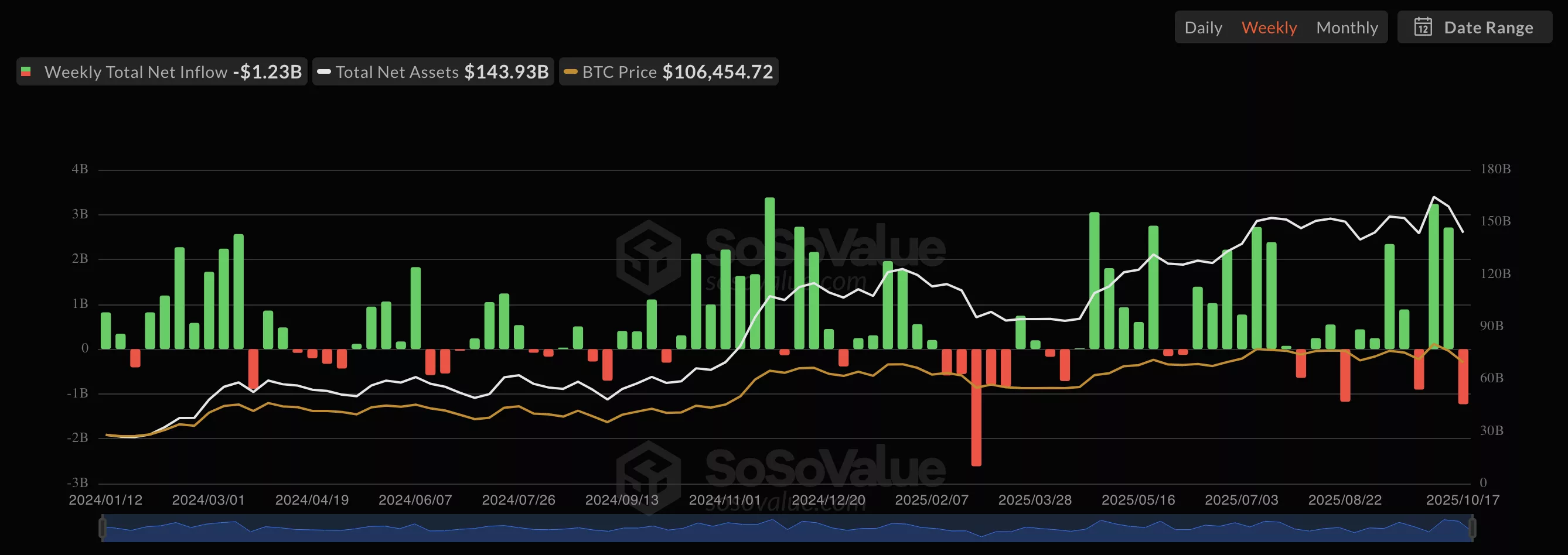In a week marked by significant turmoil, including record outflows from U.S. Bitcoin ETFs and a staggering $19 billion liquidation event, the diminishing supply on exchanges indicates a possible market rebound on the horizon.
Summary
- U.S. spot Bitcoin ETFs experienced outflows totaling $1.23 billion last week, with Friday seeing alone $366.6 million in withdrawals.
- Since early October, over 45,000 BTC have been removed from exchanges, hinting at potential stabilization or recovery.
Spot Bitcoin (BTC) ETFs in the U.S. faced substantial outflows of $1.23 billion last week amidst ongoing market volatility. Just on Friday, the outflows accounted for $366.6 million, with BlackRock’s iShares Bitcoin Trust seeing $268.6 million, Fidelity’s Bitcoin fund losing $67.2 million, and Grayscale’s GBTC having $25 million exit. Minor outflows were noted from the Valkyrie ETF, though several other products remained stable.

These outflows added to the negative sentiment following last weekend’s unprecedented liquidation event, which erased over $19 billion in leveraged positions in the crypto market. The crash was instigated by U.S. President Donald Trump’s unexpected announcement of a 100% tariff on Chinese imports and threats of export controls, leading to panic selling and low liquidity.
Bitcoin’s exchange supply hits 6-year low, signaling potential recovery
In light of last week’s record ETF outflows and overall market decline, a key metric suggests the possibility of bullish momentum: Bitcoin’s supply on exchanges has reached a six-year low. As per Glassnode data, more than 45,000 BTC — valued at around $4.81 billion — have been withdrawn from exchanges since October began. Historically, shrinking exchange reserves have reduced selling pressure, often facilitating a price recovery or market stabilization.
This aligns with the observations of numerous analysts: despite the turmoil of last week, the broader market trend indicates strength beneath the surface. For instance, Scott Melker, host of The Wolf of All Streets podcast, asserts that although events like last weekend’s liquidation necessitate risk repricing, they do not imply the onset of a bear market.
“What transpired last week was fundamentally structural. Such incidents compel everyone to pause, reassess risk, and reconsider what’s feasible (and problematic) in the market… Meanwhile, public companies are adding BTC to their balance sheets. Luxembourg has made Eurozone history. CME is preparing for round-the-clock trading. The growth of stablecoin issuers is remarkable. States are gearing up to purchase Bitcoin. The S&P is launching a crypto index.”
Disclosure: This article is not intended as investment advice. The content and materials presented on this page are solely for educational purposes.

